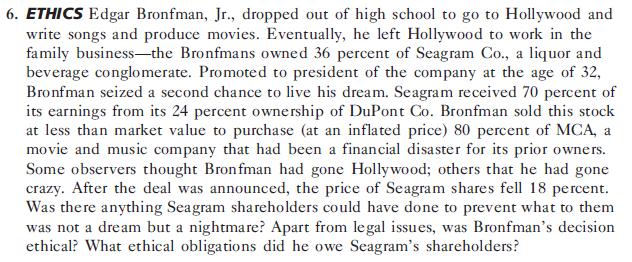Question:

Transcribed Image Text:
6. ETHICS Edgar Bronfman, Jr., dropped out of high school to go to Hollywood and write songs and produce movies. Eventually, he left Hollywood to work in the family business-the Bronfmans owned 36 percent of Seagram Co., a liquor and beverage conglomerate. Promoted to president of the company at the age of 32, Bronfman seized a second chance to live his dream. Seagram received 70 percent of its earnings from its 24 percent ownership of DuPont Co. Bronfman sold this stock at less than market value to purchase (at an inflated price) 80 percent of MCA, a movie and music company that had been a financial disaster for its prior owners. Some observers thought Bronfman had gone Hollywood; others that he had gone crazy. After the deal was announced, the price of Seagram shares fell 18 percent. Was there anything Seagram shareholders could have done to prevent what to them was not a dream but a nightmare? Apart from legal issues, was Bronfman's decision ethical? What ethical obligations did he owe Seagram's shareholders?








